A semester of learning concluded with a gift of caring when two First Year Seminar (FYS) classes collaborated recently to host a dinner party for a family of 40 on behalf of their incarcerated relative. And the sentiment, “Wish you were here,” took on difficult and obvious poignancy this Christmas.
Students in Professor Tori Pelz’s FYS, Jails, Justice and the Artist’s Response, joined forces with Professor Deb Coyle’s FYS, Comfort Food, to serve as proxy hosts for Gregory, a local inmate and poet. Together, the two classes threw “Gregory’s Dinner Party,” a solemn but festive gathering which provided lessons in empathy and social-change engagement for Hope students as well as comfort and newfound pride for Gregory’s family. The event was the culminating project for Pelz’s class that explored how socially engaged art could be a vehicle for pursuing social justice, specifically in response to mass incarceration.
“Extending hospitality is an empowering act itself. It signifies privilege and freedom through personal space, mobility, and invitation, all of which Gregory does not have access to. So we became his hands and feet.”
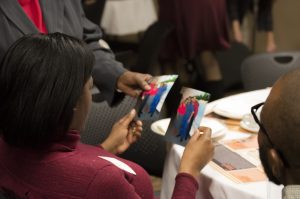
“Too many times we see mass incarceration as an abstract issue but it’s a human one, of course,” says Pelz, assistant professor of art. “So, I wanted my students to experience how art could take the form of radical hospitality, as they created a hospitable environment by listening to and enacting the wishes of their incarcerated collaborator.
“Extending hospitality is an empowering act itself,” she continues. “It signifies privilege and freedom through personal space, mobility, and invitation, all of which Gregory does not have access to. So we became his hands and feet.”
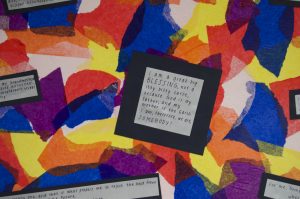
“Introduced” to Gregory through Curt Tofteland, the founder of Shakespeare Behind Bars and a friend of Gregory’s, Pelz’s students spent several weeks learning more about Gregory’s story and his talents. Imprisoned for 22 years, Gregory is a “deep soul” who has taken to writing, especially poetry. “He is an incredible writer and poet,” Pelz says. “Many of his poems incorporate Shakespearian references of fate and redemption and speak to shared humanity of both tragic and comedic characters… So, we knew his writing would be an anchoring, artistic element of our project.”
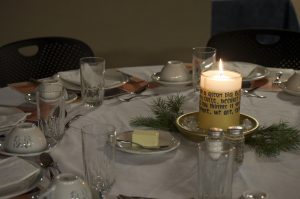 Though the event was Pelz’s idea, Gregory choreographed every aspect of the evening, from the menu to the décor. Her students corresponded with him during the semester to ask his wishes, learning about what he would want if he were indeed the one to be the on-site host. His poetry was the centerpiece of the evening, providing content for the students’ performances and visual displays. Students also contributed their creative gifts through harp music, singing performances, and artistic displays via placemat design and other decor. The family joined in as well, spontaneously singing gospel songs and offering toasts to Gregory.
Though the event was Pelz’s idea, Gregory choreographed every aspect of the evening, from the menu to the décor. Her students corresponded with him during the semester to ask his wishes, learning about what he would want if he were indeed the one to be the on-site host. His poetry was the centerpiece of the evening, providing content for the students’ performances and visual displays. Students also contributed their creative gifts through harp music, singing performances, and artistic displays via placemat design and other decor. The family joined in as well, spontaneously singing gospel songs and offering toasts to Gregory.
“This is when I knew this project was successful socially-engaged art,” Pelz explained, “when the public we were collaborating with took ownership of the outcome.”
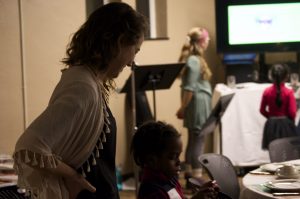
Separated by decades and significant miles, many of Gregory’s relatives struggled to regularly visit him over the years, and some of the younger relatives had yet to meet him. Time and distance can move memories into fading, and up until a week before the event, Gregory had communicated that only three family members would be attending his dinner party.
Yet, when word got out to more of his extended family, the guest list grew to 40. And on the first snowy night in Michigan this winter, several carloads of his relatives drove across the state, from Detroit to Holland, to reconnect with Gregory in absentia. As his family sat down to write him postcards that evening, the one person not physically present in the room had the strongest aura. Gregory was not there but he was, too. And that was the entire point of the evening.
As his family sat down to write him postcards that evening, the one person not physically present in the room had the strongest aura. Gregory was not there but he was, too. And that was the entire point of the evening.
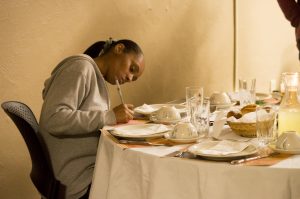
“The dinner party – it was beautiful,” Pelz emotes. “It was a sweet mix of healing and celebration. You could sense a renewed pride for Gregory by his family. Many of them didn’t fully realize the transformation that he had undergone. They were taken aback by his poetry and the depth of his wisdom. This was an opportunity to be proud of their brother, son, nephew. Gregory is incredibly blessed to have such an army of loved ones who have not forgotten about him. It was powerful for my students to see that network, too — that for every prisoner, there is a family who also suffers and aches for their reunion.”
“We should acknowledge the mistakes made by incarcerated individuals, but we should also acknowledge all of the factors that contributed to those mistakes and honor that person’s genuine desire to change.”
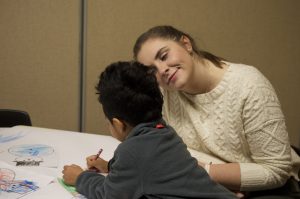
Course goals were met and then some for Pelz’s students. While they came to know critical factors that contribute to the current state of mass incarceration in America and how certain works of art can lead to conversations about that issue, they also gained empathic wisdom, greater compassion for the incarcerated, and memories of an evening they’ll never forget.
“I spent a lot of time in this class thinking about my own flawed assessments of forgiveness, rehabilitation, and the hidden populations in America,” freshman Leah Krudy explained. “Meeting a group of kind people made for a nice evening, but seeing a family capable of such resilience was truly powerful.
“If it had not been for the final project, I probably would read Gregory’s sentence and given up on him… I want Gregory to be a free man. I want him to experience life and put his talents to use.”
“This final project allowed me to see an example of someone who I truly want out of prison,” Krudy continued. “I want Gregory to be a free man. I want him to experience life and put his talents to use. If it had not been for the final project, I probably would read Gregory’s sentence and given up on him. Unfortunately, many people, including families, do just that when it comes to the incarcerated.”
Freshman Julia Kirby added, “We should acknowledge the mistakes made by incarcerated individuals, but we should also acknowledge all of the factors that contributed to those mistakes and honor that person’s genuine desire to change. I am going to take away from this project the truth that my humanity makes me equal to all other humans regardless of our mistakes and that even though I may only be one, small person in a sea of millions, I possess a voice and talents that can be used to create change.”

